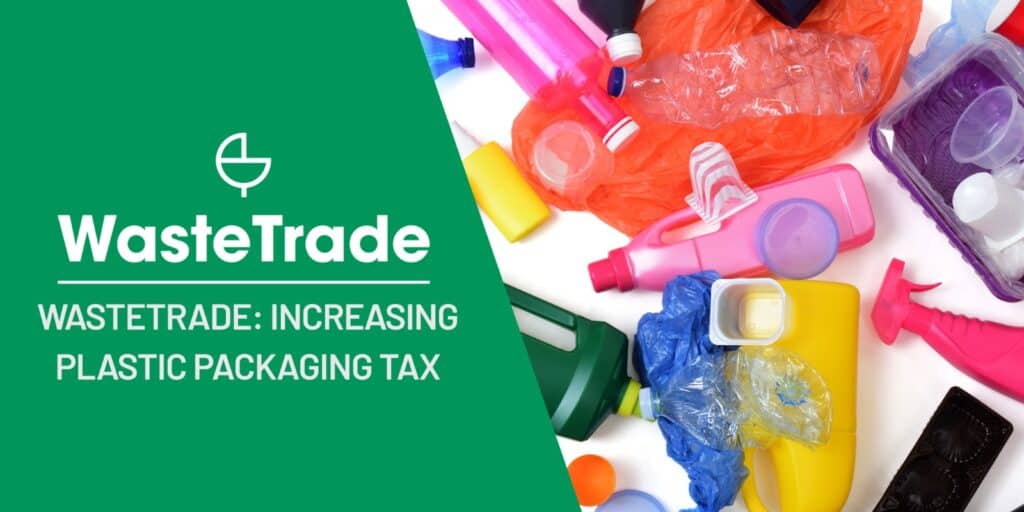Dec 6, 2023
Plastic Packaging Tax Increase to £500 Per Tonne

In the wake of the recent Autumn Statement, the Environmental Services Association (ESA) has voiced its concerns and suggested a significant increase in the Plastic Packaging Tax. They propose raising the tax to £500 per tonne, coupled with a 50% minimum recycled content threshold for plastic packaging products.
The UK Government, however, plans to legislate an increase in the Plastic Packaging Tax rate to £217.85 per tonne from 1 April 2024, adjusting in line with the Consumer Price Indices (CPI). Additionally, there is a commitment to publish an evaluation plan by the end of the year to further incentivise the use of recycled plastic in packaging.
Jacob Hayler, the Executive Director of ESA, expressed disappointment at the government’s approach. He commented, “As a result of low virgin polymer prices and the wider macroeconomic outlook, the plastics recycling sector is seeing weak demand for recycled material despite governmental ambitions and consumer appetites encouraging greater use of recycled plastic. In a double-whammy disappointment for the sector, adding to last week’s announcement that packaging recycling targets (61% for plastic) will remain unchanged in 2024, yesterday’s Autumn Statement missed an opportunity to rectify this situation by escalating the plastic packaging tax rate.”
Challenging Government Stance
The response to the Chancellor’s Autumn Statement from Sian Sutherland, Co-Founder of A Plastic Planet & PlasticFree, was equally critical. Sutherland pointed out the inadequacies in addressing plastic replacement technologies and the insufficient rise in the plastic packaging tax. “We could be eradicating toxic single-use plastics from our nation and yet the Government shies away from action.”
Financial Outcomes and Solutions
In the financial year 2022 to 2023, the Plastic Packaging Tax receipts collected by HM Revenue and Customs (HMRC) totalled £276 million, surpassing its target by £41 million. Despite exceeding the HMRC targets, with an initial estimate of generating £235 million in its first 12 months, the tax’s impact on recycling rates and the use of recycled materials remains a concern. Hayler emphasized the need for both supply and demand-side measures, stating, “Government’s ambition to achieve a 65% municipal recycling rate by 2035, and the inclusion of Energy-from-Waste within the Emissions Trading Scheme from 2028, will increase the supply of recycled plastic into the market and this must be met with corresponding demand-side measures.”
WasteTrade Perspective
WasteTrade, a leader in the waste management and recycling industry, echoes the call for an increase in the minimum requirement for recycled content in plastic packaging products. We firmly believe that while the rise in the Plastic Packaging Tax and the establishment of higher recycled content thresholds are commendable steps, these initiatives need to be implemented judiciously to prevent any setbacks in sustainable advancements or unintentional repercussions that might cause a negative perception of recycling.
Simply increasing the recycled content requirement and the fine for non-compliance could potentially impede the industry and the broader economy if the recycling sector does not receive adequate support to address the growing demand for recycled materials. The £276 million generated by the Plastic Packaging Tax last year should be invested into the recycling sector to increase its capacity, enhance its infrastructure, and make it easier and more profitable for waste producers to send their scrap materials to recycling facilities.
At WasteTrade, we believe that achieving the government’s recycling targets and accelerating the shift towards a circular economy demands a robust and well-supported recycling sector. Prioritising support for the industry and the businesses within it that are spearheading our transition to a circular economy is essential. Without this foundational support, the government’s ambitious targets may not be attainable. At WasteTrade, we are committed to playing our part in this transformation and call for coordinated efforts to ensure a sustainable and efficient recycling ecosystem.





